Ethical Analysis of Volkswagen's Emission Scandal: A Business Report
VerifiedAdded on 2020/10/05
|11
|3606
|418
Report
AI Summary
This report provides an in-depth analysis of the Volkswagen emission scandal, examining the ethical dimensions of the company's actions. It begins with an introduction to ethics and its importance in business, setting the stage for an examination of the scandal. The report then delves into the nature of the ethical issue, highlighting the role of businesses in society and the specific actions that led to the scandal. It identifies key stakeholders affected by the scandal and assesses the impact on each group, including employees, shareholders, and customers. The report further explores the importance of ethical thinking in organizations and provides recommendations for Volkswagen, such as setting up ethical policies, improving communication, and implementing regular audits. Two prominent ethical theories, utilitarianism and deontological theory, are applied to analyze the case, providing different perspectives on the ethical implications of Volkswagen's decisions. The report concludes by emphasizing the significance of ethical leadership and organizational practices in preventing similar ethical failures in the future.
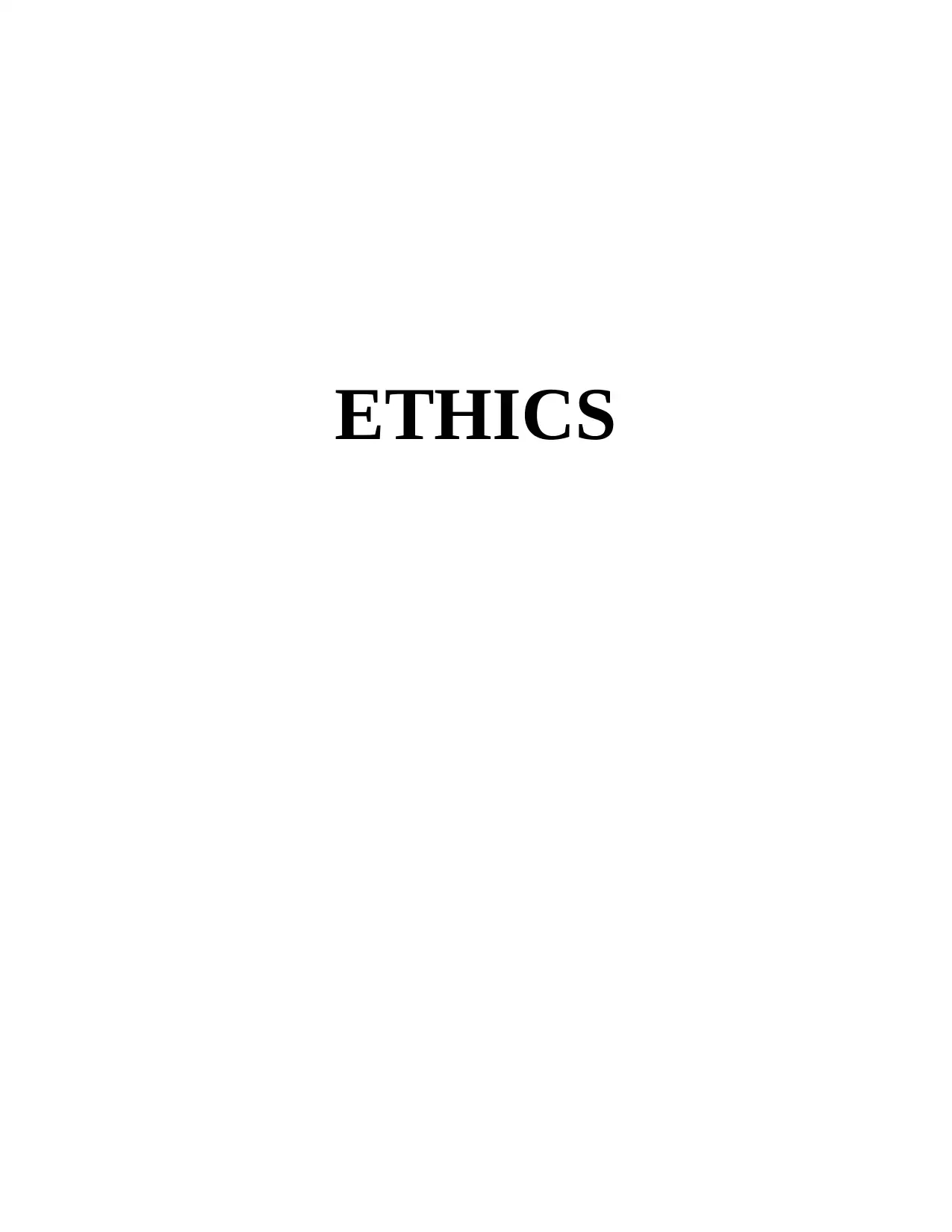
ETHICS
Paraphrase This Document
Need a fresh take? Get an instant paraphrase of this document with our AI Paraphraser
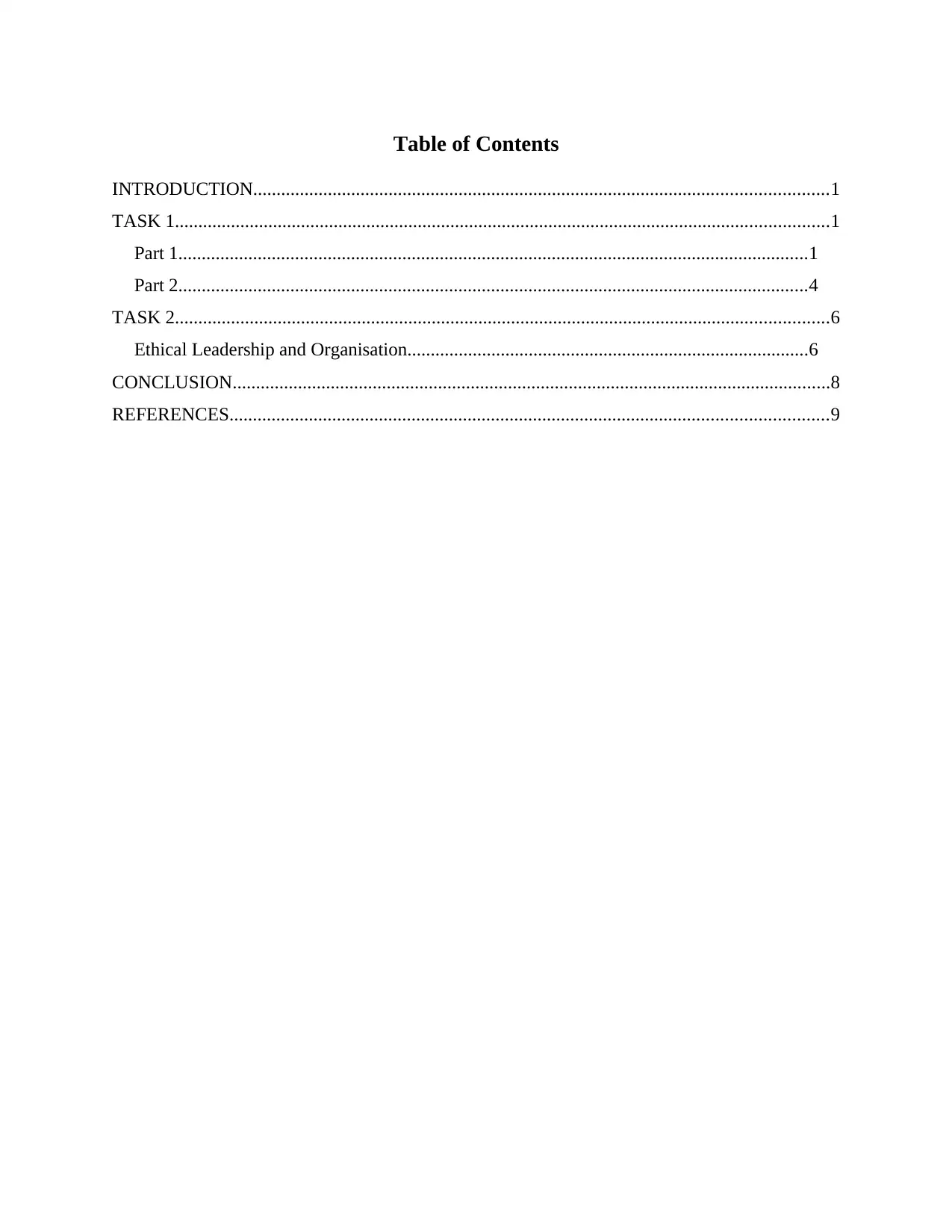
Table of Contents
INTRODUCTION...........................................................................................................................1
TASK 1............................................................................................................................................1
Part 1.......................................................................................................................................1
Part 2.......................................................................................................................................4
TASK 2............................................................................................................................................6
Ethical Leadership and Organisation......................................................................................6
CONCLUSION................................................................................................................................8
REFERENCES................................................................................................................................9
INTRODUCTION...........................................................................................................................1
TASK 1............................................................................................................................................1
Part 1.......................................................................................................................................1
Part 2.......................................................................................................................................4
TASK 2............................................................................................................................................6
Ethical Leadership and Organisation......................................................................................6
CONCLUSION................................................................................................................................8
REFERENCES................................................................................................................................9
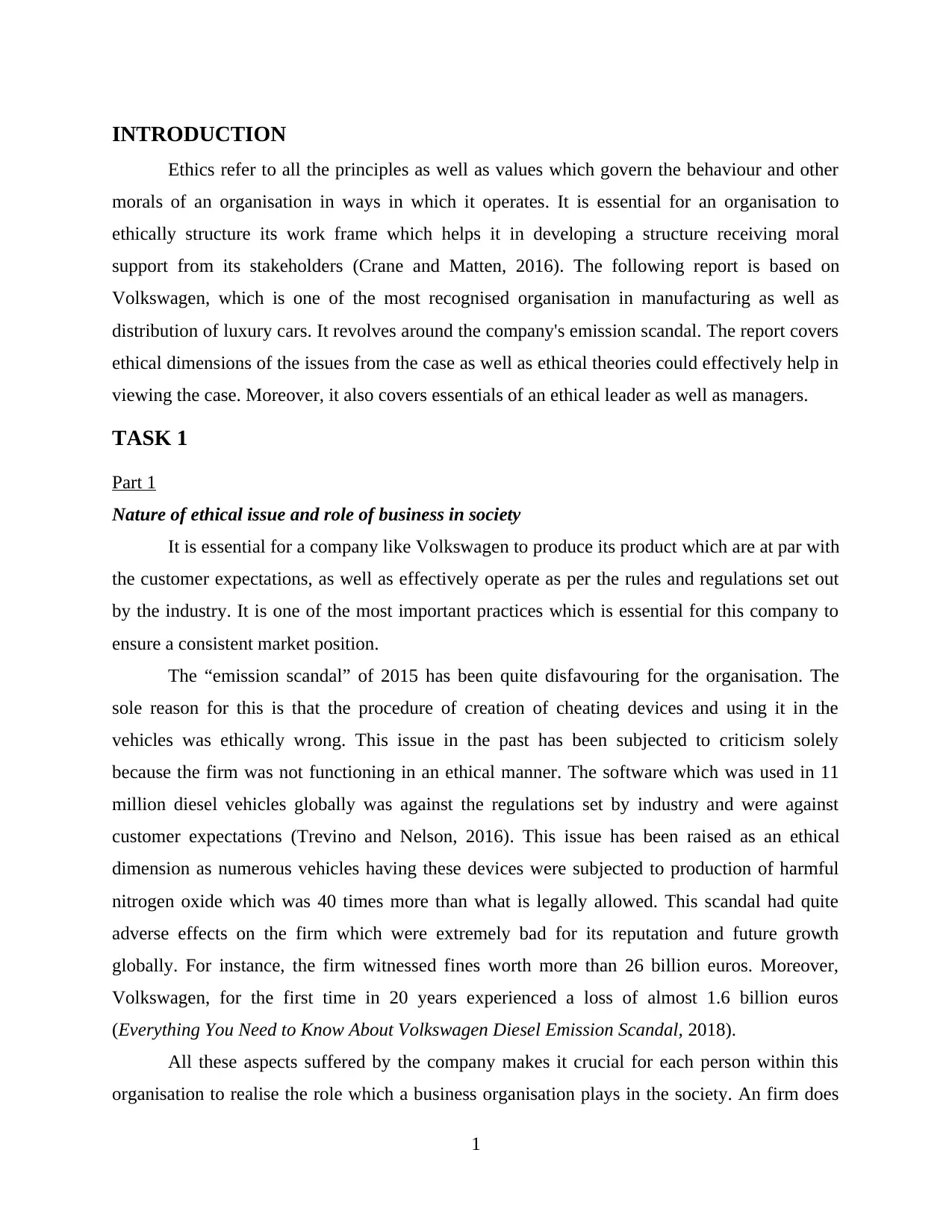
INTRODUCTION
Ethics refer to all the principles as well as values which govern the behaviour and other
morals of an organisation in ways in which it operates. It is essential for an organisation to
ethically structure its work frame which helps it in developing a structure receiving moral
support from its stakeholders (Crane and Matten, 2016). The following report is based on
Volkswagen, which is one of the most recognised organisation in manufacturing as well as
distribution of luxury cars. It revolves around the company's emission scandal. The report covers
ethical dimensions of the issues from the case as well as ethical theories could effectively help in
viewing the case. Moreover, it also covers essentials of an ethical leader as well as managers.
TASK 1
Part 1
Nature of ethical issue and role of business in society
It is essential for a company like Volkswagen to produce its product which are at par with
the customer expectations, as well as effectively operate as per the rules and regulations set out
by the industry. It is one of the most important practices which is essential for this company to
ensure a consistent market position.
The “emission scandal” of 2015 has been quite disfavouring for the organisation. The
sole reason for this is that the procedure of creation of cheating devices and using it in the
vehicles was ethically wrong. This issue in the past has been subjected to criticism solely
because the firm was not functioning in an ethical manner. The software which was used in 11
million diesel vehicles globally was against the regulations set by industry and were against
customer expectations (Trevino and Nelson, 2016). This issue has been raised as an ethical
dimension as numerous vehicles having these devices were subjected to production of harmful
nitrogen oxide which was 40 times more than what is legally allowed. This scandal had quite
adverse effects on the firm which were extremely bad for its reputation and future growth
globally. For instance, the firm witnessed fines worth more than 26 billion euros. Moreover,
Volkswagen, for the first time in 20 years experienced a loss of almost 1.6 billion euros
(Everything You Need to Know About Volkswagen Diesel Emission Scandal, 2018).
All these aspects suffered by the company makes it crucial for each person within this
organisation to realise the role which a business organisation plays in the society. An firm does
1
Ethics refer to all the principles as well as values which govern the behaviour and other
morals of an organisation in ways in which it operates. It is essential for an organisation to
ethically structure its work frame which helps it in developing a structure receiving moral
support from its stakeholders (Crane and Matten, 2016). The following report is based on
Volkswagen, which is one of the most recognised organisation in manufacturing as well as
distribution of luxury cars. It revolves around the company's emission scandal. The report covers
ethical dimensions of the issues from the case as well as ethical theories could effectively help in
viewing the case. Moreover, it also covers essentials of an ethical leader as well as managers.
TASK 1
Part 1
Nature of ethical issue and role of business in society
It is essential for a company like Volkswagen to produce its product which are at par with
the customer expectations, as well as effectively operate as per the rules and regulations set out
by the industry. It is one of the most important practices which is essential for this company to
ensure a consistent market position.
The “emission scandal” of 2015 has been quite disfavouring for the organisation. The
sole reason for this is that the procedure of creation of cheating devices and using it in the
vehicles was ethically wrong. This issue in the past has been subjected to criticism solely
because the firm was not functioning in an ethical manner. The software which was used in 11
million diesel vehicles globally was against the regulations set by industry and were against
customer expectations (Trevino and Nelson, 2016). This issue has been raised as an ethical
dimension as numerous vehicles having these devices were subjected to production of harmful
nitrogen oxide which was 40 times more than what is legally allowed. This scandal had quite
adverse effects on the firm which were extremely bad for its reputation and future growth
globally. For instance, the firm witnessed fines worth more than 26 billion euros. Moreover,
Volkswagen, for the first time in 20 years experienced a loss of almost 1.6 billion euros
(Everything You Need to Know About Volkswagen Diesel Emission Scandal, 2018).
All these aspects suffered by the company makes it crucial for each person within this
organisation to realise the role which a business organisation plays in the society. An firm does
1
⊘ This is a preview!⊘
Do you want full access?
Subscribe today to unlock all pages.

Trusted by 1+ million students worldwide
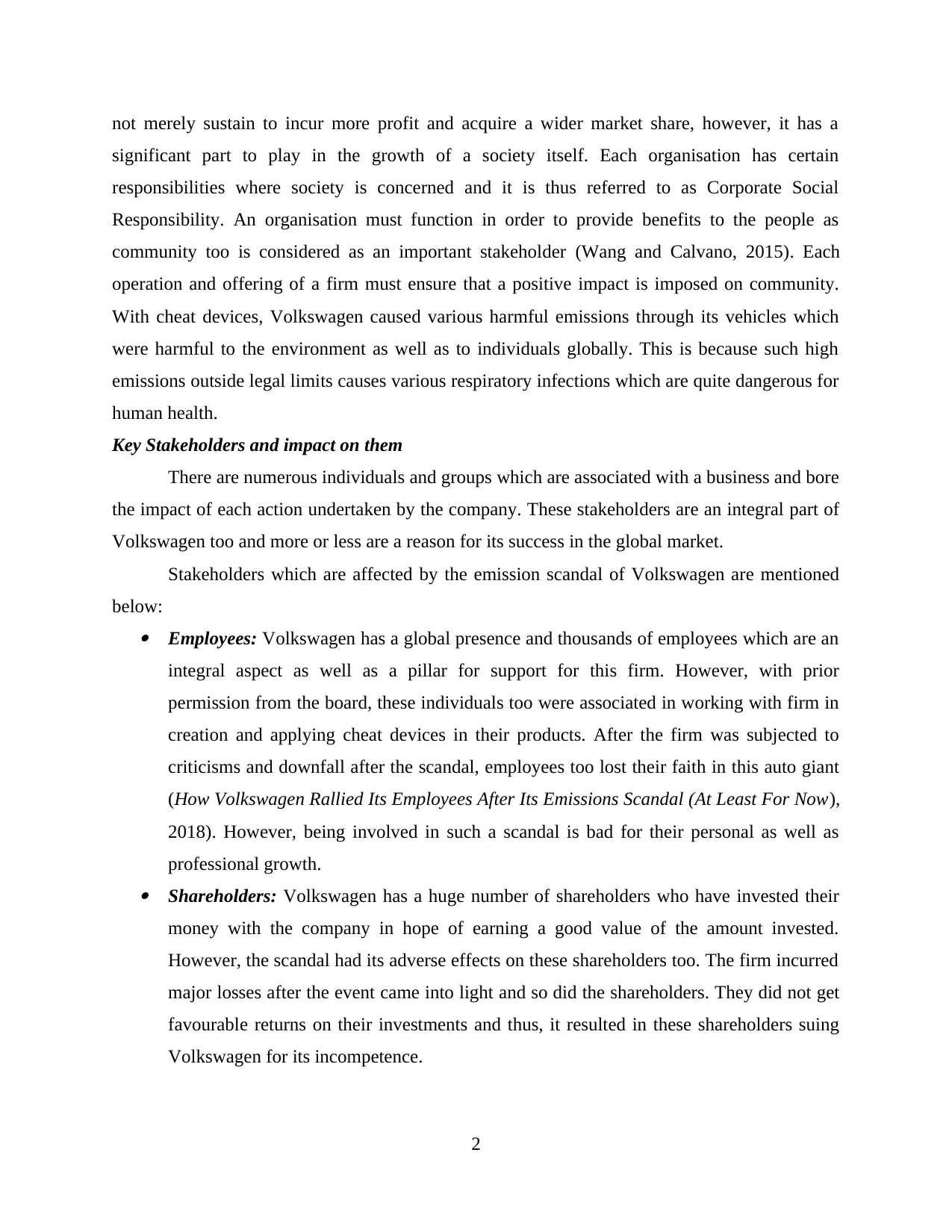
not merely sustain to incur more profit and acquire a wider market share, however, it has a
significant part to play in the growth of a society itself. Each organisation has certain
responsibilities where society is concerned and it is thus referred to as Corporate Social
Responsibility. An organisation must function in order to provide benefits to the people as
community too is considered as an important stakeholder (Wang and Calvano, 2015). Each
operation and offering of a firm must ensure that a positive impact is imposed on community.
With cheat devices, Volkswagen caused various harmful emissions through its vehicles which
were harmful to the environment as well as to individuals globally. This is because such high
emissions outside legal limits causes various respiratory infections which are quite dangerous for
human health.
Key Stakeholders and impact on them
There are numerous individuals and groups which are associated with a business and bore
the impact of each action undertaken by the company. These stakeholders are an integral part of
Volkswagen too and more or less are a reason for its success in the global market.
Stakeholders which are affected by the emission scandal of Volkswagen are mentioned
below: Employees: Volkswagen has a global presence and thousands of employees which are an
integral aspect as well as a pillar for support for this firm. However, with prior
permission from the board, these individuals too were associated in working with firm in
creation and applying cheat devices in their products. After the firm was subjected to
criticisms and downfall after the scandal, employees too lost their faith in this auto giant
(How Volkswagen Rallied Its Employees After Its Emissions Scandal (At Least For Now),
2018). However, being involved in such a scandal is bad for their personal as well as
professional growth. Shareholders: Volkswagen has a huge number of shareholders who have invested their
money with the company in hope of earning a good value of the amount invested.
However, the scandal had its adverse effects on these shareholders too. The firm incurred
major losses after the event came into light and so did the shareholders. They did not get
favourable returns on their investments and thus, it resulted in these shareholders suing
Volkswagen for its incompetence.
2
significant part to play in the growth of a society itself. Each organisation has certain
responsibilities where society is concerned and it is thus referred to as Corporate Social
Responsibility. An organisation must function in order to provide benefits to the people as
community too is considered as an important stakeholder (Wang and Calvano, 2015). Each
operation and offering of a firm must ensure that a positive impact is imposed on community.
With cheat devices, Volkswagen caused various harmful emissions through its vehicles which
were harmful to the environment as well as to individuals globally. This is because such high
emissions outside legal limits causes various respiratory infections which are quite dangerous for
human health.
Key Stakeholders and impact on them
There are numerous individuals and groups which are associated with a business and bore
the impact of each action undertaken by the company. These stakeholders are an integral part of
Volkswagen too and more or less are a reason for its success in the global market.
Stakeholders which are affected by the emission scandal of Volkswagen are mentioned
below: Employees: Volkswagen has a global presence and thousands of employees which are an
integral aspect as well as a pillar for support for this firm. However, with prior
permission from the board, these individuals too were associated in working with firm in
creation and applying cheat devices in their products. After the firm was subjected to
criticisms and downfall after the scandal, employees too lost their faith in this auto giant
(How Volkswagen Rallied Its Employees After Its Emissions Scandal (At Least For Now),
2018). However, being involved in such a scandal is bad for their personal as well as
professional growth. Shareholders: Volkswagen has a huge number of shareholders who have invested their
money with the company in hope of earning a good value of the amount invested.
However, the scandal had its adverse effects on these shareholders too. The firm incurred
major losses after the event came into light and so did the shareholders. They did not get
favourable returns on their investments and thus, it resulted in these shareholders suing
Volkswagen for its incompetence.
2
Paraphrase This Document
Need a fresh take? Get an instant paraphrase of this document with our AI Paraphraser
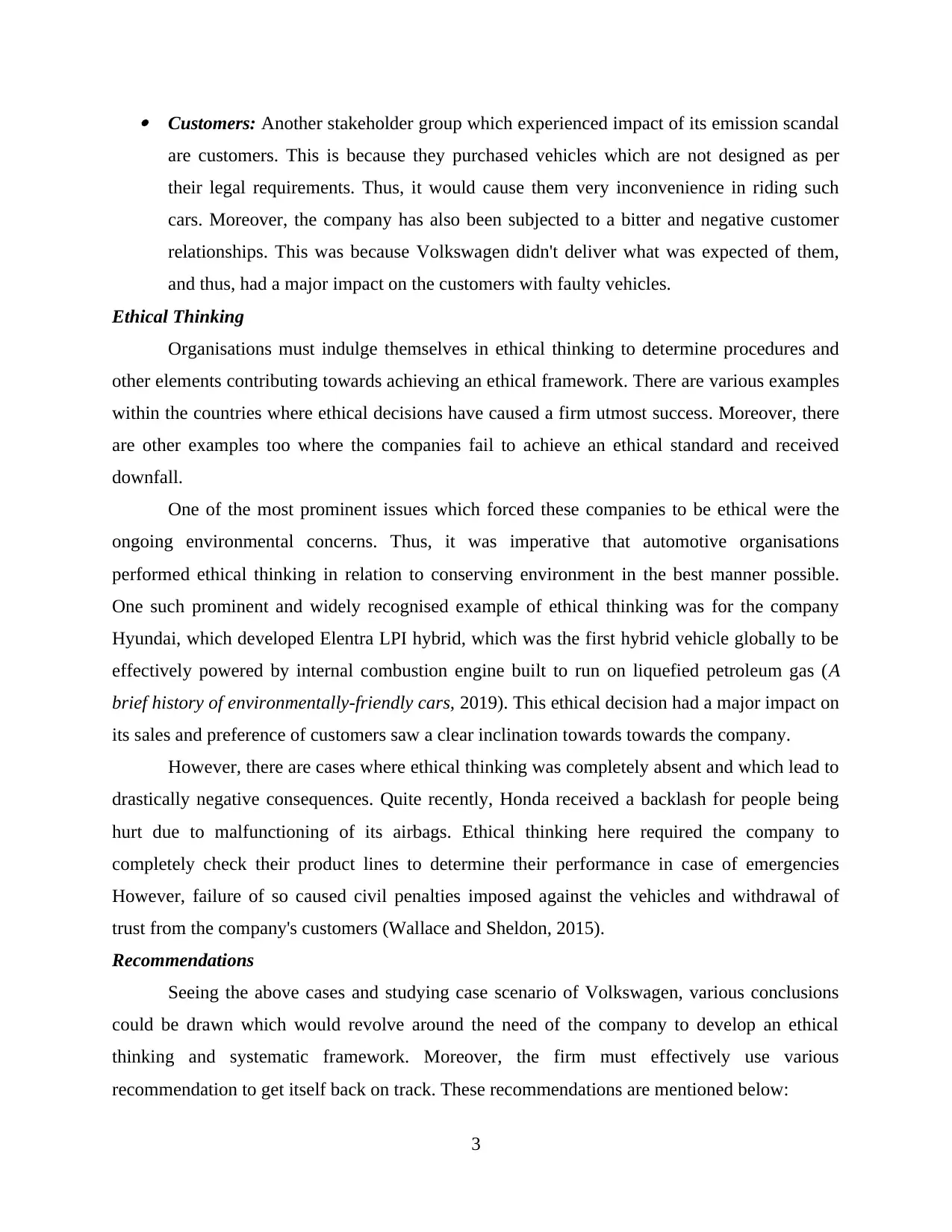
Customers: Another stakeholder group which experienced impact of its emission scandal
are customers. This is because they purchased vehicles which are not designed as per
their legal requirements. Thus, it would cause them very inconvenience in riding such
cars. Moreover, the company has also been subjected to a bitter and negative customer
relationships. This was because Volkswagen didn't deliver what was expected of them,
and thus, had a major impact on the customers with faulty vehicles.
Ethical Thinking
Organisations must indulge themselves in ethical thinking to determine procedures and
other elements contributing towards achieving an ethical framework. There are various examples
within the countries where ethical decisions have caused a firm utmost success. Moreover, there
are other examples too where the companies fail to achieve an ethical standard and received
downfall.
One of the most prominent issues which forced these companies to be ethical were the
ongoing environmental concerns. Thus, it was imperative that automotive organisations
performed ethical thinking in relation to conserving environment in the best manner possible.
One such prominent and widely recognised example of ethical thinking was for the company
Hyundai, which developed Elentra LPI hybrid, which was the first hybrid vehicle globally to be
effectively powered by internal combustion engine built to run on liquefied petroleum gas (A
brief history of environmentally-friendly cars, 2019). This ethical decision had a major impact on
its sales and preference of customers saw a clear inclination towards towards the company.
However, there are cases where ethical thinking was completely absent and which lead to
drastically negative consequences. Quite recently, Honda received a backlash for people being
hurt due to malfunctioning of its airbags. Ethical thinking here required the company to
completely check their product lines to determine their performance in case of emergencies
However, failure of so caused civil penalties imposed against the vehicles and withdrawal of
trust from the company's customers (Wallace and Sheldon, 2015).
Recommendations
Seeing the above cases and studying case scenario of Volkswagen, various conclusions
could be drawn which would revolve around the need of the company to develop an ethical
thinking and systematic framework. Moreover, the firm must effectively use various
recommendation to get itself back on track. These recommendations are mentioned below:
3
are customers. This is because they purchased vehicles which are not designed as per
their legal requirements. Thus, it would cause them very inconvenience in riding such
cars. Moreover, the company has also been subjected to a bitter and negative customer
relationships. This was because Volkswagen didn't deliver what was expected of them,
and thus, had a major impact on the customers with faulty vehicles.
Ethical Thinking
Organisations must indulge themselves in ethical thinking to determine procedures and
other elements contributing towards achieving an ethical framework. There are various examples
within the countries where ethical decisions have caused a firm utmost success. Moreover, there
are other examples too where the companies fail to achieve an ethical standard and received
downfall.
One of the most prominent issues which forced these companies to be ethical were the
ongoing environmental concerns. Thus, it was imperative that automotive organisations
performed ethical thinking in relation to conserving environment in the best manner possible.
One such prominent and widely recognised example of ethical thinking was for the company
Hyundai, which developed Elentra LPI hybrid, which was the first hybrid vehicle globally to be
effectively powered by internal combustion engine built to run on liquefied petroleum gas (A
brief history of environmentally-friendly cars, 2019). This ethical decision had a major impact on
its sales and preference of customers saw a clear inclination towards towards the company.
However, there are cases where ethical thinking was completely absent and which lead to
drastically negative consequences. Quite recently, Honda received a backlash for people being
hurt due to malfunctioning of its airbags. Ethical thinking here required the company to
completely check their product lines to determine their performance in case of emergencies
However, failure of so caused civil penalties imposed against the vehicles and withdrawal of
trust from the company's customers (Wallace and Sheldon, 2015).
Recommendations
Seeing the above cases and studying case scenario of Volkswagen, various conclusions
could be drawn which would revolve around the need of the company to develop an ethical
thinking and systematic framework. Moreover, the firm must effectively use various
recommendation to get itself back on track. These recommendations are mentioned below:
3
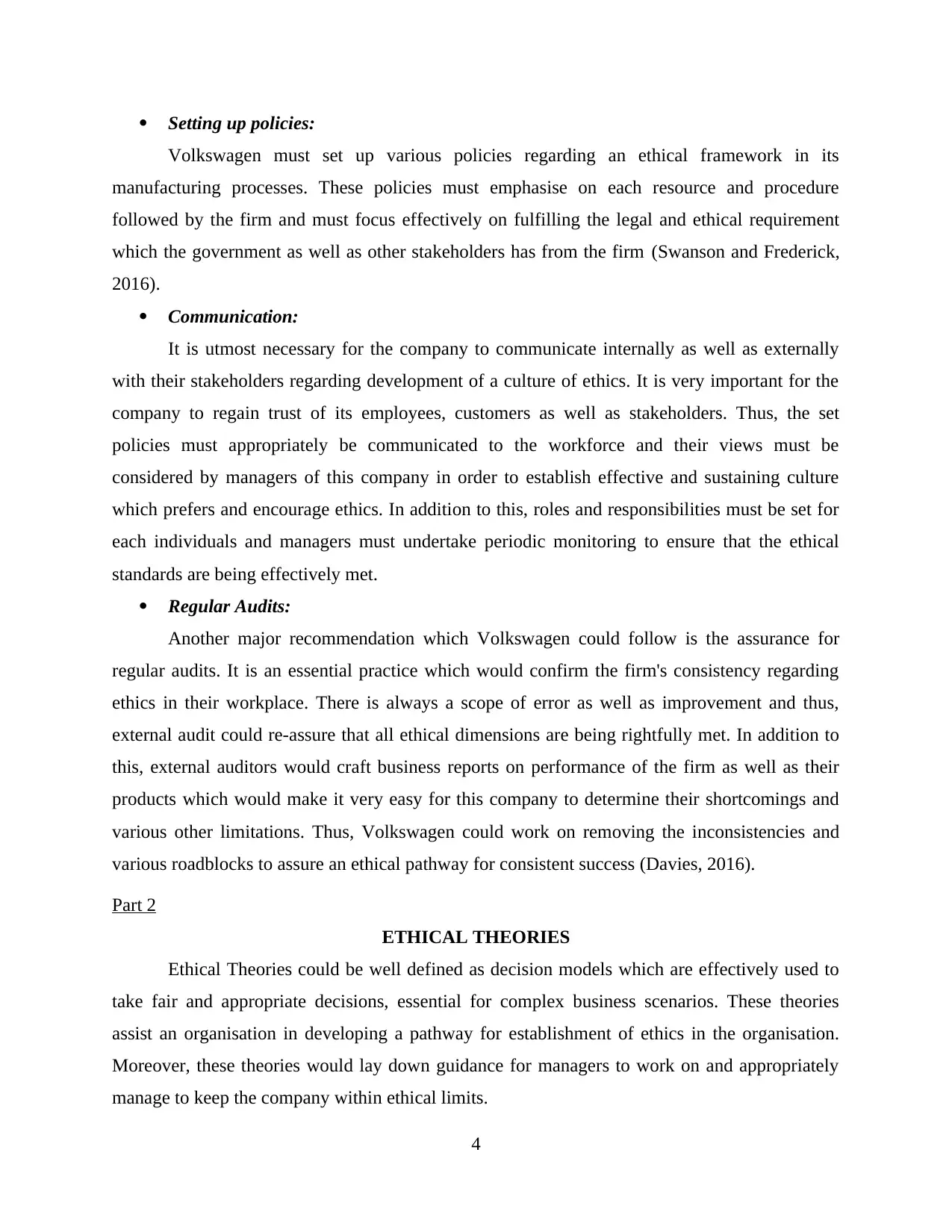
Setting up policies:
Volkswagen must set up various policies regarding an ethical framework in its
manufacturing processes. These policies must emphasise on each resource and procedure
followed by the firm and must focus effectively on fulfilling the legal and ethical requirement
which the government as well as other stakeholders has from the firm (Swanson and Frederick,
2016).
Communication:
It is utmost necessary for the company to communicate internally as well as externally
with their stakeholders regarding development of a culture of ethics. It is very important for the
company to regain trust of its employees, customers as well as stakeholders. Thus, the set
policies must appropriately be communicated to the workforce and their views must be
considered by managers of this company in order to establish effective and sustaining culture
which prefers and encourage ethics. In addition to this, roles and responsibilities must be set for
each individuals and managers must undertake periodic monitoring to ensure that the ethical
standards are being effectively met.
Regular Audits:
Another major recommendation which Volkswagen could follow is the assurance for
regular audits. It is an essential practice which would confirm the firm's consistency regarding
ethics in their workplace. There is always a scope of error as well as improvement and thus,
external audit could re-assure that all ethical dimensions are being rightfully met. In addition to
this, external auditors would craft business reports on performance of the firm as well as their
products which would make it very easy for this company to determine their shortcomings and
various other limitations. Thus, Volkswagen could work on removing the inconsistencies and
various roadblocks to assure an ethical pathway for consistent success (Davies, 2016).
Part 2
ETHICAL THEORIES
Ethical Theories could be well defined as decision models which are effectively used to
take fair and appropriate decisions, essential for complex business scenarios. These theories
assist an organisation in developing a pathway for establishment of ethics in the organisation.
Moreover, these theories would lay down guidance for managers to work on and appropriately
manage to keep the company within ethical limits.
4
Volkswagen must set up various policies regarding an ethical framework in its
manufacturing processes. These policies must emphasise on each resource and procedure
followed by the firm and must focus effectively on fulfilling the legal and ethical requirement
which the government as well as other stakeholders has from the firm (Swanson and Frederick,
2016).
Communication:
It is utmost necessary for the company to communicate internally as well as externally
with their stakeholders regarding development of a culture of ethics. It is very important for the
company to regain trust of its employees, customers as well as stakeholders. Thus, the set
policies must appropriately be communicated to the workforce and their views must be
considered by managers of this company in order to establish effective and sustaining culture
which prefers and encourage ethics. In addition to this, roles and responsibilities must be set for
each individuals and managers must undertake periodic monitoring to ensure that the ethical
standards are being effectively met.
Regular Audits:
Another major recommendation which Volkswagen could follow is the assurance for
regular audits. It is an essential practice which would confirm the firm's consistency regarding
ethics in their workplace. There is always a scope of error as well as improvement and thus,
external audit could re-assure that all ethical dimensions are being rightfully met. In addition to
this, external auditors would craft business reports on performance of the firm as well as their
products which would make it very easy for this company to determine their shortcomings and
various other limitations. Thus, Volkswagen could work on removing the inconsistencies and
various roadblocks to assure an ethical pathway for consistent success (Davies, 2016).
Part 2
ETHICAL THEORIES
Ethical Theories could be well defined as decision models which are effectively used to
take fair and appropriate decisions, essential for complex business scenarios. These theories
assist an organisation in developing a pathway for establishment of ethics in the organisation.
Moreover, these theories would lay down guidance for managers to work on and appropriately
manage to keep the company within ethical limits.
4
⊘ This is a preview!⊘
Do you want full access?
Subscribe today to unlock all pages.

Trusted by 1+ million students worldwide
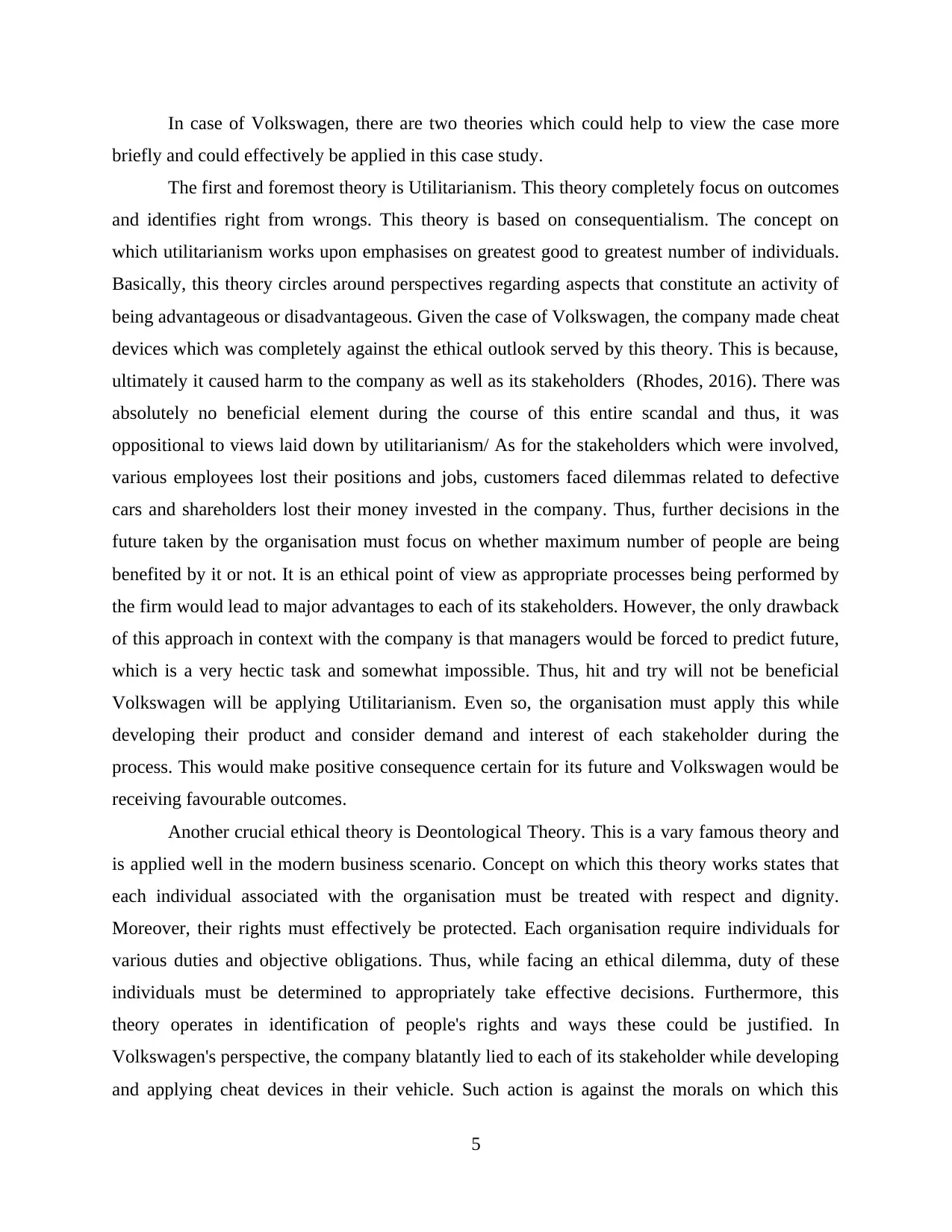
In case of Volkswagen, there are two theories which could help to view the case more
briefly and could effectively be applied in this case study.
The first and foremost theory is Utilitarianism. This theory completely focus on outcomes
and identifies right from wrongs. This theory is based on consequentialism. The concept on
which utilitarianism works upon emphasises on greatest good to greatest number of individuals.
Basically, this theory circles around perspectives regarding aspects that constitute an activity of
being advantageous or disadvantageous. Given the case of Volkswagen, the company made cheat
devices which was completely against the ethical outlook served by this theory. This is because,
ultimately it caused harm to the company as well as its stakeholders (Rhodes, 2016). There was
absolutely no beneficial element during the course of this entire scandal and thus, it was
oppositional to views laid down by utilitarianism/ As for the stakeholders which were involved,
various employees lost their positions and jobs, customers faced dilemmas related to defective
cars and shareholders lost their money invested in the company. Thus, further decisions in the
future taken by the organisation must focus on whether maximum number of people are being
benefited by it or not. It is an ethical point of view as appropriate processes being performed by
the firm would lead to major advantages to each of its stakeholders. However, the only drawback
of this approach in context with the company is that managers would be forced to predict future,
which is a very hectic task and somewhat impossible. Thus, hit and try will not be beneficial
Volkswagen will be applying Utilitarianism. Even so, the organisation must apply this while
developing their product and consider demand and interest of each stakeholder during the
process. This would make positive consequence certain for its future and Volkswagen would be
receiving favourable outcomes.
Another crucial ethical theory is Deontological Theory. This is a vary famous theory and
is applied well in the modern business scenario. Concept on which this theory works states that
each individual associated with the organisation must be treated with respect and dignity.
Moreover, their rights must effectively be protected. Each organisation require individuals for
various duties and objective obligations. Thus, while facing an ethical dilemma, duty of these
individuals must be determined to appropriately take effective decisions. Furthermore, this
theory operates in identification of people's rights and ways these could be justified. In
Volkswagen's perspective, the company blatantly lied to each of its stakeholder while developing
and applying cheat devices in their vehicle. Such action is against the morals on which this
5
briefly and could effectively be applied in this case study.
The first and foremost theory is Utilitarianism. This theory completely focus on outcomes
and identifies right from wrongs. This theory is based on consequentialism. The concept on
which utilitarianism works upon emphasises on greatest good to greatest number of individuals.
Basically, this theory circles around perspectives regarding aspects that constitute an activity of
being advantageous or disadvantageous. Given the case of Volkswagen, the company made cheat
devices which was completely against the ethical outlook served by this theory. This is because,
ultimately it caused harm to the company as well as its stakeholders (Rhodes, 2016). There was
absolutely no beneficial element during the course of this entire scandal and thus, it was
oppositional to views laid down by utilitarianism/ As for the stakeholders which were involved,
various employees lost their positions and jobs, customers faced dilemmas related to defective
cars and shareholders lost their money invested in the company. Thus, further decisions in the
future taken by the organisation must focus on whether maximum number of people are being
benefited by it or not. It is an ethical point of view as appropriate processes being performed by
the firm would lead to major advantages to each of its stakeholders. However, the only drawback
of this approach in context with the company is that managers would be forced to predict future,
which is a very hectic task and somewhat impossible. Thus, hit and try will not be beneficial
Volkswagen will be applying Utilitarianism. Even so, the organisation must apply this while
developing their product and consider demand and interest of each stakeholder during the
process. This would make positive consequence certain for its future and Volkswagen would be
receiving favourable outcomes.
Another crucial ethical theory is Deontological Theory. This is a vary famous theory and
is applied well in the modern business scenario. Concept on which this theory works states that
each individual associated with the organisation must be treated with respect and dignity.
Moreover, their rights must effectively be protected. Each organisation require individuals for
various duties and objective obligations. Thus, while facing an ethical dilemma, duty of these
individuals must be determined to appropriately take effective decisions. Furthermore, this
theory operates in identification of people's rights and ways these could be justified. In
Volkswagen's perspective, the company blatantly lied to each of its stakeholder while developing
and applying cheat devices in their vehicle. Such action is against the morals on which this
5
Paraphrase This Document
Need a fresh take? Get an instant paraphrase of this document with our AI Paraphraser
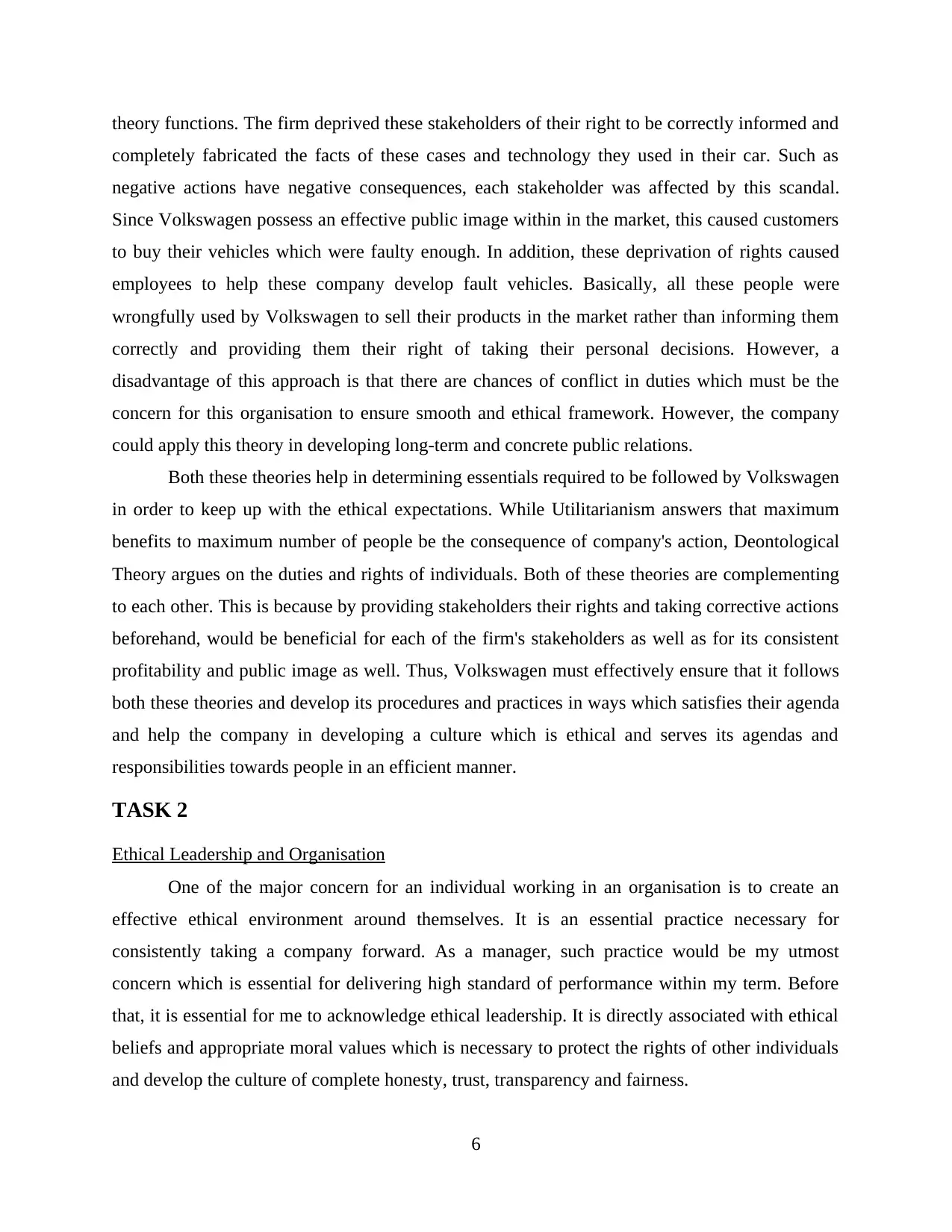
theory functions. The firm deprived these stakeholders of their right to be correctly informed and
completely fabricated the facts of these cases and technology they used in their car. Such as
negative actions have negative consequences, each stakeholder was affected by this scandal.
Since Volkswagen possess an effective public image within in the market, this caused customers
to buy their vehicles which were faulty enough. In addition, these deprivation of rights caused
employees to help these company develop fault vehicles. Basically, all these people were
wrongfully used by Volkswagen to sell their products in the market rather than informing them
correctly and providing them their right of taking their personal decisions. However, a
disadvantage of this approach is that there are chances of conflict in duties which must be the
concern for this organisation to ensure smooth and ethical framework. However, the company
could apply this theory in developing long-term and concrete public relations.
Both these theories help in determining essentials required to be followed by Volkswagen
in order to keep up with the ethical expectations. While Utilitarianism answers that maximum
benefits to maximum number of people be the consequence of company's action, Deontological
Theory argues on the duties and rights of individuals. Both of these theories are complementing
to each other. This is because by providing stakeholders their rights and taking corrective actions
beforehand, would be beneficial for each of the firm's stakeholders as well as for its consistent
profitability and public image as well. Thus, Volkswagen must effectively ensure that it follows
both these theories and develop its procedures and practices in ways which satisfies their agenda
and help the company in developing a culture which is ethical and serves its agendas and
responsibilities towards people in an efficient manner.
TASK 2
Ethical Leadership and Organisation
One of the major concern for an individual working in an organisation is to create an
effective ethical environment around themselves. It is an essential practice necessary for
consistently taking a company forward. As a manager, such practice would be my utmost
concern which is essential for delivering high standard of performance within my term. Before
that, it is essential for me to acknowledge ethical leadership. It is directly associated with ethical
beliefs and appropriate moral values which is necessary to protect the rights of other individuals
and develop the culture of complete honesty, trust, transparency and fairness.
6
completely fabricated the facts of these cases and technology they used in their car. Such as
negative actions have negative consequences, each stakeholder was affected by this scandal.
Since Volkswagen possess an effective public image within in the market, this caused customers
to buy their vehicles which were faulty enough. In addition, these deprivation of rights caused
employees to help these company develop fault vehicles. Basically, all these people were
wrongfully used by Volkswagen to sell their products in the market rather than informing them
correctly and providing them their right of taking their personal decisions. However, a
disadvantage of this approach is that there are chances of conflict in duties which must be the
concern for this organisation to ensure smooth and ethical framework. However, the company
could apply this theory in developing long-term and concrete public relations.
Both these theories help in determining essentials required to be followed by Volkswagen
in order to keep up with the ethical expectations. While Utilitarianism answers that maximum
benefits to maximum number of people be the consequence of company's action, Deontological
Theory argues on the duties and rights of individuals. Both of these theories are complementing
to each other. This is because by providing stakeholders their rights and taking corrective actions
beforehand, would be beneficial for each of the firm's stakeholders as well as for its consistent
profitability and public image as well. Thus, Volkswagen must effectively ensure that it follows
both these theories and develop its procedures and practices in ways which satisfies their agenda
and help the company in developing a culture which is ethical and serves its agendas and
responsibilities towards people in an efficient manner.
TASK 2
Ethical Leadership and Organisation
One of the major concern for an individual working in an organisation is to create an
effective ethical environment around themselves. It is an essential practice necessary for
consistently taking a company forward. As a manager, such practice would be my utmost
concern which is essential for delivering high standard of performance within my term. Before
that, it is essential for me to acknowledge ethical leadership. It is directly associated with ethical
beliefs and appropriate moral values which is necessary to protect the rights of other individuals
and develop the culture of complete honesty, trust, transparency and fairness.
6
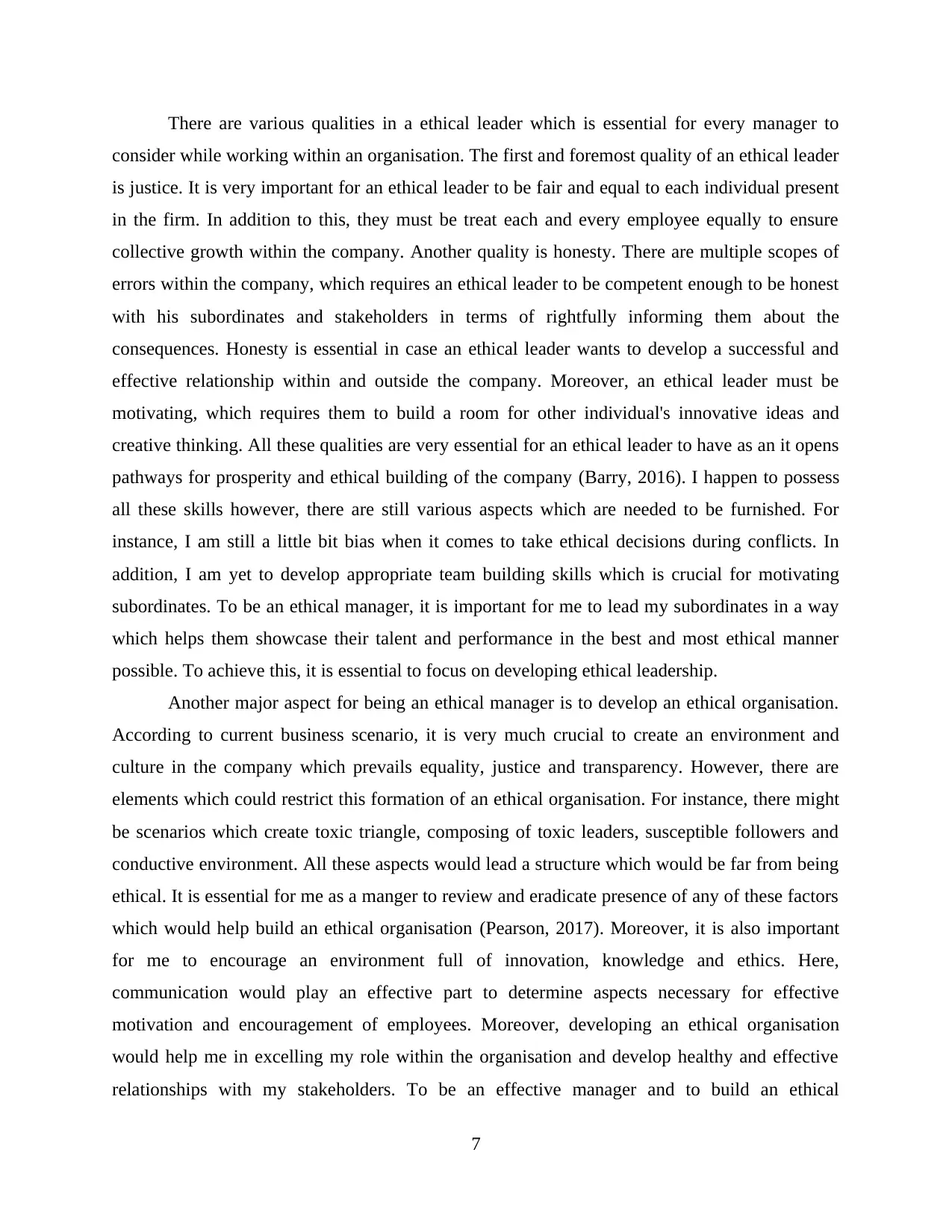
There are various qualities in a ethical leader which is essential for every manager to
consider while working within an organisation. The first and foremost quality of an ethical leader
is justice. It is very important for an ethical leader to be fair and equal to each individual present
in the firm. In addition to this, they must be treat each and every employee equally to ensure
collective growth within the company. Another quality is honesty. There are multiple scopes of
errors within the company, which requires an ethical leader to be competent enough to be honest
with his subordinates and stakeholders in terms of rightfully informing them about the
consequences. Honesty is essential in case an ethical leader wants to develop a successful and
effective relationship within and outside the company. Moreover, an ethical leader must be
motivating, which requires them to build a room for other individual's innovative ideas and
creative thinking. All these qualities are very essential for an ethical leader to have as an it opens
pathways for prosperity and ethical building of the company (Barry, 2016). I happen to possess
all these skills however, there are still various aspects which are needed to be furnished. For
instance, I am still a little bit bias when it comes to take ethical decisions during conflicts. In
addition, I am yet to develop appropriate team building skills which is crucial for motivating
subordinates. To be an ethical manager, it is important for me to lead my subordinates in a way
which helps them showcase their talent and performance in the best and most ethical manner
possible. To achieve this, it is essential to focus on developing ethical leadership.
Another major aspect for being an ethical manager is to develop an ethical organisation.
According to current business scenario, it is very much crucial to create an environment and
culture in the company which prevails equality, justice and transparency. However, there are
elements which could restrict this formation of an ethical organisation. For instance, there might
be scenarios which create toxic triangle, composing of toxic leaders, susceptible followers and
conductive environment. All these aspects would lead a structure which would be far from being
ethical. It is essential for me as a manger to review and eradicate presence of any of these factors
which would help build an ethical organisation (Pearson, 2017). Moreover, it is also important
for me to encourage an environment full of innovation, knowledge and ethics. Here,
communication would play an effective part to determine aspects necessary for effective
motivation and encouragement of employees. Moreover, developing an ethical organisation
would help me in excelling my role within the organisation and develop healthy and effective
relationships with my stakeholders. To be an effective manager and to build an ethical
7
consider while working within an organisation. The first and foremost quality of an ethical leader
is justice. It is very important for an ethical leader to be fair and equal to each individual present
in the firm. In addition to this, they must be treat each and every employee equally to ensure
collective growth within the company. Another quality is honesty. There are multiple scopes of
errors within the company, which requires an ethical leader to be competent enough to be honest
with his subordinates and stakeholders in terms of rightfully informing them about the
consequences. Honesty is essential in case an ethical leader wants to develop a successful and
effective relationship within and outside the company. Moreover, an ethical leader must be
motivating, which requires them to build a room for other individual's innovative ideas and
creative thinking. All these qualities are very essential for an ethical leader to have as an it opens
pathways for prosperity and ethical building of the company (Barry, 2016). I happen to possess
all these skills however, there are still various aspects which are needed to be furnished. For
instance, I am still a little bit bias when it comes to take ethical decisions during conflicts. In
addition, I am yet to develop appropriate team building skills which is crucial for motivating
subordinates. To be an ethical manager, it is important for me to lead my subordinates in a way
which helps them showcase their talent and performance in the best and most ethical manner
possible. To achieve this, it is essential to focus on developing ethical leadership.
Another major aspect for being an ethical manager is to develop an ethical organisation.
According to current business scenario, it is very much crucial to create an environment and
culture in the company which prevails equality, justice and transparency. However, there are
elements which could restrict this formation of an ethical organisation. For instance, there might
be scenarios which create toxic triangle, composing of toxic leaders, susceptible followers and
conductive environment. All these aspects would lead a structure which would be far from being
ethical. It is essential for me as a manger to review and eradicate presence of any of these factors
which would help build an ethical organisation (Pearson, 2017). Moreover, it is also important
for me to encourage an environment full of innovation, knowledge and ethics. Here,
communication would play an effective part to determine aspects necessary for effective
motivation and encouragement of employees. Moreover, developing an ethical organisation
would help me in excelling my role within the organisation and develop healthy and effective
relationships with my stakeholders. To be an effective manager and to build an ethical
7
⊘ This is a preview!⊘
Do you want full access?
Subscribe today to unlock all pages.

Trusted by 1+ million students worldwide
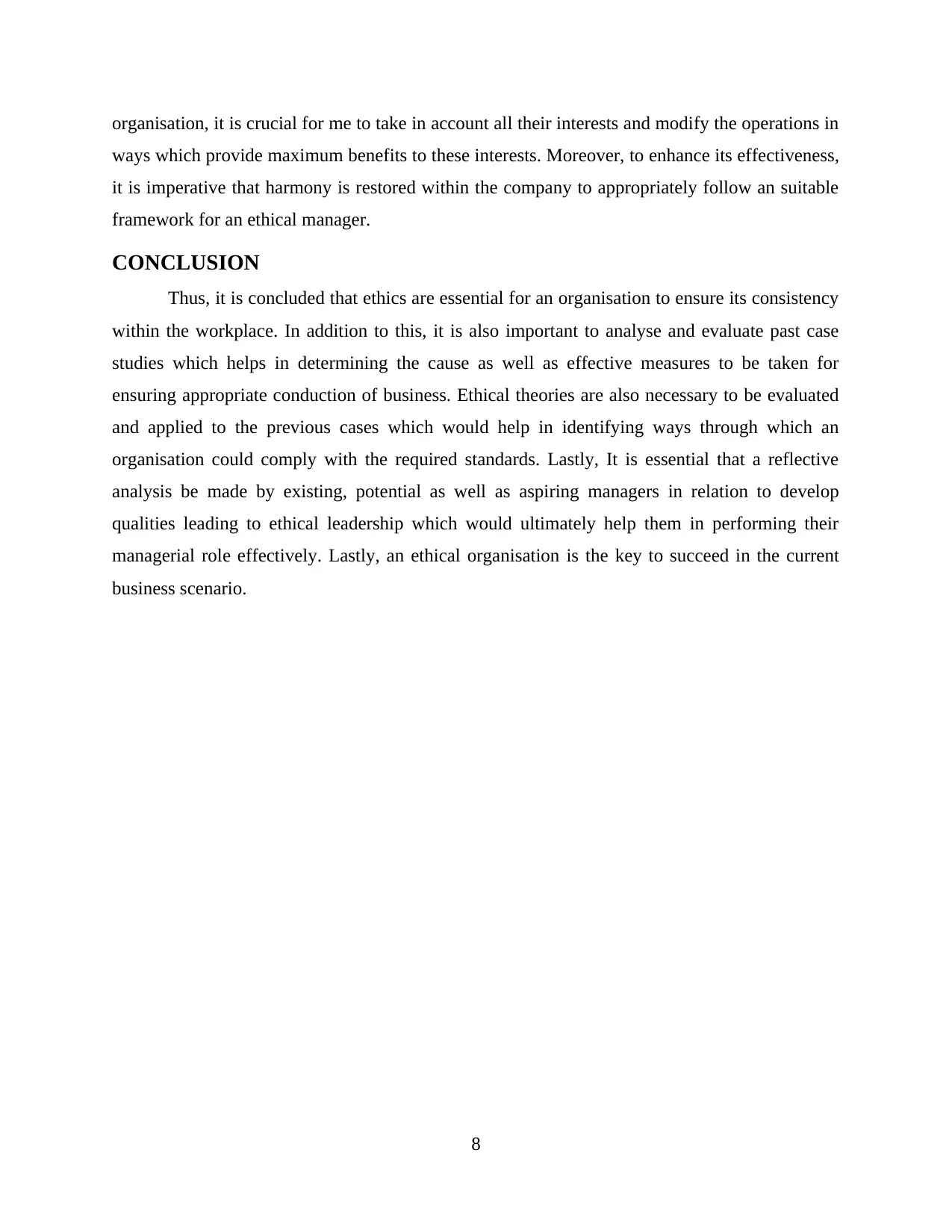
organisation, it is crucial for me to take in account all their interests and modify the operations in
ways which provide maximum benefits to these interests. Moreover, to enhance its effectiveness,
it is imperative that harmony is restored within the company to appropriately follow an suitable
framework for an ethical manager.
CONCLUSION
Thus, it is concluded that ethics are essential for an organisation to ensure its consistency
within the workplace. In addition to this, it is also important to analyse and evaluate past case
studies which helps in determining the cause as well as effective measures to be taken for
ensuring appropriate conduction of business. Ethical theories are also necessary to be evaluated
and applied to the previous cases which would help in identifying ways through which an
organisation could comply with the required standards. Lastly, It is essential that a reflective
analysis be made by existing, potential as well as aspiring managers in relation to develop
qualities leading to ethical leadership which would ultimately help them in performing their
managerial role effectively. Lastly, an ethical organisation is the key to succeed in the current
business scenario.
8
ways which provide maximum benefits to these interests. Moreover, to enhance its effectiveness,
it is imperative that harmony is restored within the company to appropriately follow an suitable
framework for an ethical manager.
CONCLUSION
Thus, it is concluded that ethics are essential for an organisation to ensure its consistency
within the workplace. In addition to this, it is also important to analyse and evaluate past case
studies which helps in determining the cause as well as effective measures to be taken for
ensuring appropriate conduction of business. Ethical theories are also necessary to be evaluated
and applied to the previous cases which would help in identifying ways through which an
organisation could comply with the required standards. Lastly, It is essential that a reflective
analysis be made by existing, potential as well as aspiring managers in relation to develop
qualities leading to ethical leadership which would ultimately help them in performing their
managerial role effectively. Lastly, an ethical organisation is the key to succeed in the current
business scenario.
8
Paraphrase This Document
Need a fresh take? Get an instant paraphrase of this document with our AI Paraphraser
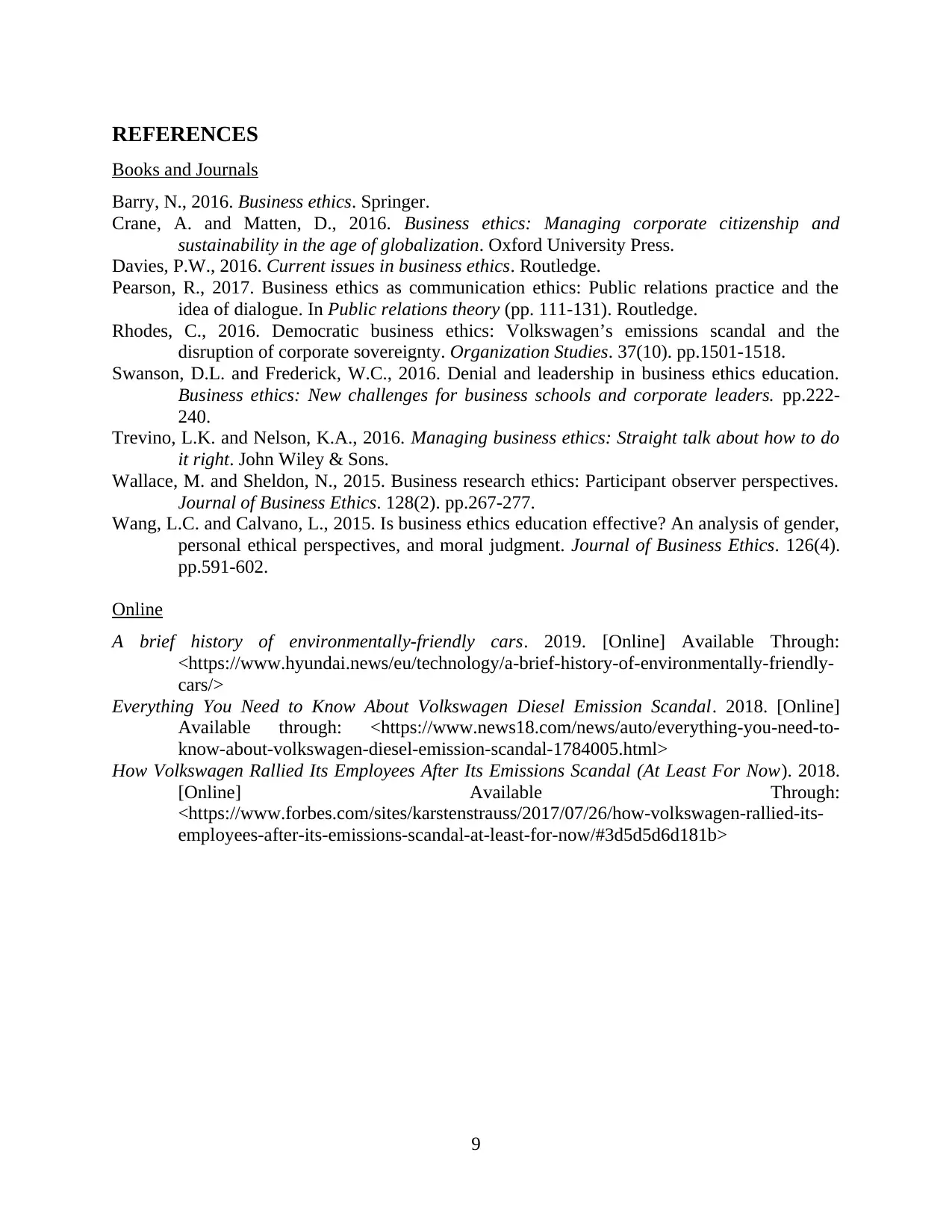
REFERENCES
Books and Journals
Barry, N., 2016. Business ethics. Springer.
Crane, A. and Matten, D., 2016. Business ethics: Managing corporate citizenship and
sustainability in the age of globalization. Oxford University Press.
Davies, P.W., 2016. Current issues in business ethics. Routledge.
Pearson, R., 2017. Business ethics as communication ethics: Public relations practice and the
idea of dialogue. In Public relations theory (pp. 111-131). Routledge.
Rhodes, C., 2016. Democratic business ethics: Volkswagen’s emissions scandal and the
disruption of corporate sovereignty. Organization Studies. 37(10). pp.1501-1518.
Swanson, D.L. and Frederick, W.C., 2016. Denial and leadership in business ethics education.
Business ethics: New challenges for business schools and corporate leaders. pp.222-
240.
Trevino, L.K. and Nelson, K.A., 2016. Managing business ethics: Straight talk about how to do
it right. John Wiley & Sons.
Wallace, M. and Sheldon, N., 2015. Business research ethics: Participant observer perspectives.
Journal of Business Ethics. 128(2). pp.267-277.
Wang, L.C. and Calvano, L., 2015. Is business ethics education effective? An analysis of gender,
personal ethical perspectives, and moral judgment. Journal of Business Ethics. 126(4).
pp.591-602.
Online
A brief history of environmentally-friendly cars. 2019. [Online] Available Through:
<https://www.hyundai.news/eu/technology/a-brief-history-of-environmentally-friendly-
cars/>
Everything You Need to Know About Volkswagen Diesel Emission Scandal. 2018. [Online]
Available through: <https://www.news18.com/news/auto/everything-you-need-to-
know-about-volkswagen-diesel-emission-scandal-1784005.html>
How Volkswagen Rallied Its Employees After Its Emissions Scandal (At Least For Now). 2018.
[Online] Available Through:
<https://www.forbes.com/sites/karstenstrauss/2017/07/26/how-volkswagen-rallied-its-
employees-after-its-emissions-scandal-at-least-for-now/#3d5d5d6d181b>
9
Books and Journals
Barry, N., 2016. Business ethics. Springer.
Crane, A. and Matten, D., 2016. Business ethics: Managing corporate citizenship and
sustainability in the age of globalization. Oxford University Press.
Davies, P.W., 2016. Current issues in business ethics. Routledge.
Pearson, R., 2017. Business ethics as communication ethics: Public relations practice and the
idea of dialogue. In Public relations theory (pp. 111-131). Routledge.
Rhodes, C., 2016. Democratic business ethics: Volkswagen’s emissions scandal and the
disruption of corporate sovereignty. Organization Studies. 37(10). pp.1501-1518.
Swanson, D.L. and Frederick, W.C., 2016. Denial and leadership in business ethics education.
Business ethics: New challenges for business schools and corporate leaders. pp.222-
240.
Trevino, L.K. and Nelson, K.A., 2016. Managing business ethics: Straight talk about how to do
it right. John Wiley & Sons.
Wallace, M. and Sheldon, N., 2015. Business research ethics: Participant observer perspectives.
Journal of Business Ethics. 128(2). pp.267-277.
Wang, L.C. and Calvano, L., 2015. Is business ethics education effective? An analysis of gender,
personal ethical perspectives, and moral judgment. Journal of Business Ethics. 126(4).
pp.591-602.
Online
A brief history of environmentally-friendly cars. 2019. [Online] Available Through:
<https://www.hyundai.news/eu/technology/a-brief-history-of-environmentally-friendly-
cars/>
Everything You Need to Know About Volkswagen Diesel Emission Scandal. 2018. [Online]
Available through: <https://www.news18.com/news/auto/everything-you-need-to-
know-about-volkswagen-diesel-emission-scandal-1784005.html>
How Volkswagen Rallied Its Employees After Its Emissions Scandal (At Least For Now). 2018.
[Online] Available Through:
<https://www.forbes.com/sites/karstenstrauss/2017/07/26/how-volkswagen-rallied-its-
employees-after-its-emissions-scandal-at-least-for-now/#3d5d5d6d181b>
9
1 out of 11
Related Documents
Your All-in-One AI-Powered Toolkit for Academic Success.
+13062052269
info@desklib.com
Available 24*7 on WhatsApp / Email
![[object Object]](/_next/static/media/star-bottom.7253800d.svg)
Unlock your academic potential
Copyright © 2020–2026 A2Z Services. All Rights Reserved. Developed and managed by ZUCOL.





